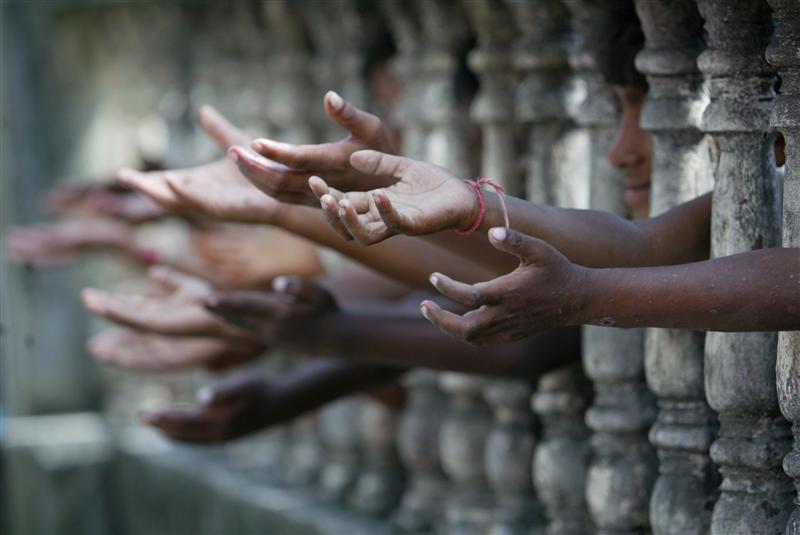
The tugs to heartstrings such children generate tempt most into giving them some money.
However, according to child protection officers, you may be doing more harm than good by giving in to your spirit of charity when it comes to child beggars. By giving them money directly, far from uplifting their lot in life, you might actually be feeding into the vicious cycle of poverty and exploitation they are already condemned to.
“People need to realise, any money they give to child beggars is hardly ever put to good use,” an officer of the Child Protection and Welfare Bureau (CPWB) told The Express Tribune. “Strict enforcement of laws alone does no good. It is difficult to create deterrence against child beggary and to force parents to invest in their children’s education when they have become cash cows for them. That is the harsh reality people must understand.”
The child protection officer said CPWB periodically conducts operations to eradicate child beggary, but their efforts appear to have little impact.
“Because of lack of manpower and resources, our priority is to create deterrence among families and gangs who force children to beg,” he said. “But the negative outcome of people’s generosity is that the same old faces keep re-appearing.”
“Child beggars we have rescued in crackdowns often have as much as Rs2,500 in their pockets. This means a person who has put just two children on the streets to beg could make as much as Rs150,000 a month,” the officer explained. “As such, when we rescue such children, their parents are happy to pay any penalty to regain their custody so they can put them back to work.”
“And as they start at a very tender age, the only skill in life these kids end up acquiring is begging. This means, their only other option apart from begging when they grow is to join criminal gangs,” he said. “The only way to break this cycle is for people to stop giving these kids any money directly.”
Child beggar emergency
“Since last month, we have declared a child beggar emergency on Punjab Chief Minister Usman Buzdar’s instructions,” said CPWB Chairperson Sarah Ahmad. “To achieve our vision of eradicating the menace, we have been carrying out operations four days a week in Punjab’s eight districts.”
“A total of 634 child beggars were rescued in the province, marking a 15 to 20 per cent speculative reduction in child beggary,” Sarah told The Express Tribune. “We are also working on a child protection policy that should incentivise parents to send their children to school.”
It is pertinent to mention that under the Punjab Destitute and Neglected Children Act 2014, Amendment 2017, making a child begging is a crime.
Section 36 of the act says: “If a person employs a child for begging or causes a child to beg or, having the custody, charge or care of a child connives at or encourages employment of the child for begging or uses a child, connives at or encourages employment of the child for begging, he shall be punished with imprisonment for a term which may extend to five years but which shall not be less than three months and with fine which may extend to Rs100,000 but which shall not be less than Rs10,000.”
Section 36-A states: “If a person employs or incites a child to sell goods with the intention of begging, he shall be punished with imprisonment for a term which may extend to three years but which shall not be less than three months and with fine which may extend to Rs100,000 but which shall not be less than RS10,000.”
Section 36-B adds that anyone who employs a child for rag picking, may be punished with imprisonment up to three years but which shall no less than three months.
Once again, the fine may extend up to Rs100,000. Islamic perspective Many, when asked, justify giving money to child beggars by saying they are trying to feed poor souls who cannot afford a decent meal.
Many lay Muslims also argue that they cannot refuse to give money if the beggar invokes the name of Allah. They believe the beggars will pay for their sins if they are lying.
However, when contacted, some Islamic scholars disagreed with this prevalent concept of charity.
“Charity cannot be given to an undeserving person,” said Allama Agha Saeed Hussain Muqadas. “Even in the case of Zakat, it has to first to be determined that the person you intend to give alms to is deserving of it. If you discover that the person you gave alms too was not deserving of it, then you will have to give Zakat again.”
“In light of this, how can giving charity to members of an organised begging mafia be justified?” asked Allama Muqadas. “If people want to do good by these children begging on roads, they should help them obtain education, food and other resources that can make them good human beings.”
Head of Jamia Naeemia Allama Raghib Hussain Naeemi agreed that people should avoid giving money to underage beggars. “By no means should one presume such an activity has been done to please Allah. Child beggars, like other beggars, are part of organised rackets. Giving them money only helps the racket thrive.”
Badshahi Mosque prayer leader Moulana Abdul Khabeer Azad said in order to give charity, one should first identify needy people in their family, friends’ circle, neighborhood, and surroundings. “People who you know are needy should be first in line for your charity and alms. Only after these boxes are ticked, should one move on to the random people asking for charity.”

















COMMENTS
Comments are moderated and generally will be posted if they are on-topic and not abusive.
For more information, please see our Comments FAQ